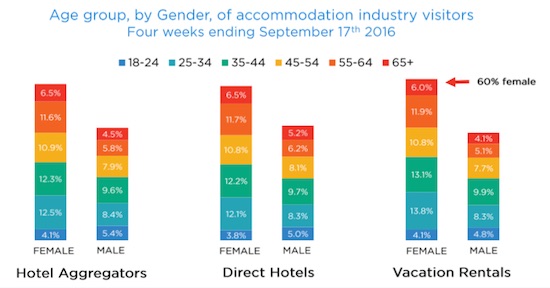
Priorities of female travelers – less automation and sharing, more details
By cameron in Uncategorized
IATA’s latest Global Passenger Survey was once again dominated by responses from men (65%).
As IATA explained to tnooz, the reason for this is not that women were largely excluded from the participant pool, but that more men felt inclined to participate when invited.
The study, published during this year’s IATA World Passenger Symposium in Barcelona, makes you ponder whether women have significantly different needs and expectations of air travel.
Tnooz asked IATA for a break-down by gender of the top travel priorities revealed in this year’s GPS report, and the organisation kindly processed that data exclusively for us.
The results reveal that women are somewhat more protective of their identity information, something which may be related to a heightened sensitivity to personal security while traveling.
When asked whether they would be willing to share additional personal information (e.g., address of destination, travel purpose, picture) when booking a flight, in order to speed up processing at the airport?
Those who answered “Yes” can be split as follows:
- Global – 70.4%
- Women – 66.8%
- Men – 72.4%
The split among those travelers surveyed who chose biometric identification as their preferred traveling token is as follows:
- Global – 63.7%%
- Women – 60.7%
- Men – 65.4%
Experientially, women appear to put somewhat less value on automation at the check-in process.
The share of passengers who prefer self-bag drop is broken down as follows:
- Global – 48.5%
- Women – 45.5%
- Men – 50.1%
When asked to choose between areas which could most improve the experience of boarding an aircraft, the priorities are broken down as follows:
1. Addressing issues around excess carry-on luggage
- Global – 37%
- Women – 40.4%
- Men – 35.1%
2. Availability of automated boarding gates
- Global – 38%
- Women – 33.2%
- Men – 40.6%
Women also appear to significantly prioritize accurate and complete updates on the details of their travel itinerary.
When asked to choose between two features that could improve the transfer experience at an airport, women seemed more patient with the process but more interested in knowing where they were going.
1. Not having to go through security at the transfer airport
- Global – 64.7%
- Women – 59.1%
- Men – 67.4%
2. Knowing the departure terminals at the time of booking
- Global – 39.7%
- Women – 46.2%
- Men – 36.6%
Destination, planning and feedback
Women also play a critical role in decisions for accommodation, and are setting trends in alternative accommodations.
Research by Hitwise shows that the majority (57.84%) of visitors to travel accommodation sites, including hotel aggregators, hotels, and vacation rentals are women; 60% of visitors to vacation rental sites are women and 31% of visitors to rental sites are women between the ages of 18-44.
Women appear to have stronger emotional connections to their travel booking decisions, and form strong opinions about their travel experience. Women are more likely than men to link travel to identity, seeing it as a way to differentiate themselves from friends. They are also more likely to want to visit new destinations.
But women do like to shop around. They are more willing to consider making travel arrangements with new travel services providers, even those with which they have no previous familiarity.
Margaret Ady, head of marketing at hotel data analytics company SnapShot, shares additional insights on women’s travel planning priorities.
“Women are most likely to do the travel research, booking, and follow up. They also travel more than men, with women comprising nearly two-thirds of all travelers, according to a 2016 study by George Washington University School of Business.
“Moreover, they comprise 54 percent of coveted affluent travelers, according to MMGY Global. Many of these women travel alone or with other women on ‘girl trips,’ bachelorette parties, or mother-daughter vacations, with nearly 40% of women planning one of these trips, according to a report by AAA.
“If we start by looking at the initial research and planning phase, women, across all travel segments (family, business, solo) do a lion’s share of the planning.
“During the booking phase, women tend to book earlier than men, which saves a significant amount of money, according to research by Carlson Wagonlit.
“During and post-stay, women do tend to write reviews. While review scores across genders are not significantly different (i.e., women are not more critical than men, or vice versa), there are differences in the way that each demographic evaluates their travel experience. Women tend to rely more on emotional factors like feeling comfortable and pampered compared to male travelers, who opt for professionalism and facilities. Women are also far more likely to mention food and beverage as well as spa and wellness in their hotel reviews.
“There is a major opportunity for travel and hospitality companies to reach this market segment by creating tailored campaigns, communication, and services specifically for women. Companies that are particularly strong in segmenting their marketing can create hyper-targeted campaigns by further breaking down the female travel segment (by family travel, business, mother-daughter vacations, single affluent, and so on). These findings should also be taken into account when creating special offers or perks: a complimentary drink or spa treatment may be of more interest to female travelers, whereas free parking or Wi-Fi vouchers may appeal more to male travelers.”
![]()

